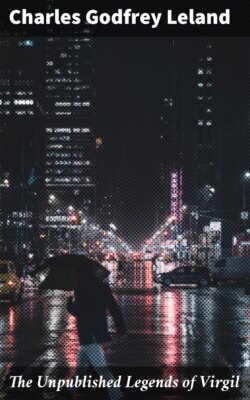Читать книгу The Unpublished Legends of Virgil - Charles Godfrey Leland - Страница 3
На сайте Литреса книга снята с продажи.
PREFACE.
ОглавлениеTable of Contents
All classic scholars are familiar with the Legends of Virgil in the Middle Ages, in which the poet appears as a magician, the last and best collection of these being that which forms the second volume of “Virgilio nel Medio Aevo,” by Senator Professor Domenico Comparetti. But having conjectured that Dante must have made Virgil familiar to the people, and that many legends or traditions still remained to be collected, I applied myself to this task, with the result that in due time I gathered, or had gathered for me, about one hundred tales, of which only three or four had a plot in common with the old Neapolitan Virgilian stories, and even these contained original and very curious additional lore. One half of these traditions will be found in this work.
As these were nearly all taken down by a fortune-teller or witch among her kind—she being singularly well qualified by years of practice in finding and recording such recondite lore—they very naturally contain much more that is occult, strange and heathen, than can be found in the other tales. Thus, wherever there is opportunity, magical ceremonies are described and incantations given; in fact, the story is often only a mere frame, as it were, in which the picture or true subject is a lesson in sorcery.
But what is most remarkable and interesting in these traditions, as I have often had occasion to remark, is the fact that they embody a vast amount of old Etrusco-Roman minor mythology of the kind chronicled by Ovid, and incidentally touched on or quoted here and there by gossiping Latin writers, yet of which no record was ever made. I am sincerely persuaded that there was an immense repertory of this fairy, goblin, or witch religion believed in by the Roman people which was never written down, but of which a great deal was preserved by sorcerers, who are mostly at the same time story-tellers among themselves, and of this much may be found in this work. And I think no critic, however inclined to doubt he may be, will deny that there is in the old mythologists collateral evidence to prove what I have asserted.
It may be observed that in these Northern legends, Virgil is in most cases spoken of as a poet as well as magician, but that he is before all, benevolent and genial, a great sage invariably doing good, while always inspired with humour. Mr. Robinson Ellis has shrewdly observed that, in reading the Neapolitan tales of Virgil, “we are painfully struck with the absence, for the most part, of any imaginative element in them.” I would, however, suggest, that in these which I have gathered with no small pains—having devoted a great part of my time for several years to the task—there is no want of imagination, romance or humour.
Such are, in brief, the contents of this book. Sincerely trusting that the press and public may treat it as kindly as they did the “Etrusco-Roman Remains,” and “The Legends of Florence,” I await the verdict, which will probably determine whether I shall publish other Italian traditions, of which I have still a very large collection.
Charles Godfrey Leland.
Florence,
1899.
